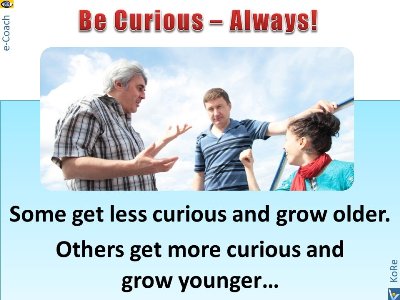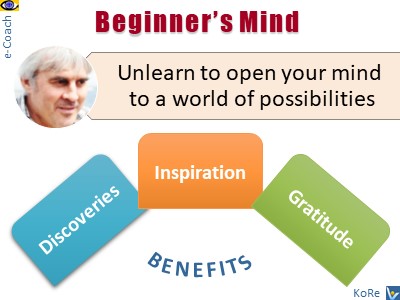|
 |
|
If get less curious you grow older; if you get more
curious you grow younger.
Curiosity fuels exploration and leads to discoveries.
When you have all answers you stagnate; when you get
curious, you start discovering.
|
|
| |
Silence
all
your
knowledge,
adopt
a
beginner’s
mind,
get
curious,
and
look
outside
and
inside
yourself
with
new
eyes
to
discover
new
outside-the-box
possibilities
for
creating
a
breakthrough. |
|
 |
| |
|
Make New Discoveries
Your knowledge from previous experience dominates your
perceptions. Make it a habit to see people and things
around you with fresh eyes everyday.
Amazing
Thinker
360 |
|
|
|
|
|
Adopt a Beginner’s Mind to see the world around you with
fresh eyes and inspire curiosity, ‘Why? What If?’
questions, outside-the-box thinking and new discoveries.
Ask childish questions to challenge your knowledge-based
assumptions, refresh your perceptions, and discover
something brand new. |
|
***
Benefits of Adopting a Beginner’s Mind
Inspiration. A Beginner’s Mind gives you the opportunity
to see the world around you with fresh eyes and inspires
curiosity, exploration, learning, outside-the-box
thinking, discovery, and disruptive innovation.
Discoveries. Serendipity and outside-the-box thinking
may be triggered equally well by seeing new things and
by looking at old things with new eyes.
Gratitude. It’s easy to take many good things in life
for granted. By seeing your life with fresh eyes, you
can truly appreciate and enjoy what you might otherwise
lose sight of.
How To Cultivate a Beginner’s Mind
Remember that nothing makes you blinder than a point of
view. Learn to unlearn! Treat your knowledge as blinders
that allow you to see what is in front of you but don’t
let you look around. Take these blinders off to see the
big picture.
Put yourself in the shoes of a complete stranger and
look at things with new eyes to make new discoveries.
Look around with an open mind and childlike curiosity to
be able to see things that you would otherwise be closed
to.
Stop assuming you know the answers and forget about
problems – look for possibilities and ask searching and
‘What If?’ questions instead.
Free yourself of preconceptions and expectations. Forget
about rules and run your imagination wild.
***
BE CURIOUS - ALWAYS!
Benefits of Curiosity
The spring of curiosity, if experimented with, can be
grown into a river of achievements. Curiosity focuses
attention, fuels exploration, and leads to discoveries.
Be Curious To Keep Making Discoveries
•Enjoy wandering mentally into unknown territories –
both outside and inside yourself.
•Replace judgment with curiosity. Keep asking searching
questions and exploring to keep discovering and growing.
•Be creatively dissatisfied and expect to make
accidental discoveries any moment.
•Free your mind from preconceptions, fixed ideas,
judgment, and expectations. Adopt a beginner’s mind,
look at old things with new eyes and ask inventive ‘Why?
What If?’ questions.
•Play with different things around you. Try to connect
randomly picked things, solutions, words, thoughts or
ideas in an unusual but meaningful combination.
•Curiously notice outside-the-box behaviors and remarks
of others.
| |
The goal of practice is always to keep our beginner’s mind.”
~ Shunryu Suzuki, Zen Mind, Beginner's Mind
"I learn as much from a turtle as from a religious text." ~ Dalai Lama.
"The most important thing is to not stop questioning." ~ Albert Einstein
“We begin with beginner’s mind, and then, if we’re lucky, we deepen it, or
return to it.” ~ Joseph Goldstein
How to Cultivate Beginner’s Mind for a Fresh Perspective
GLOSSARY
When you are new to something, you don’t know anything about it. In order to
open your mind to learn, and develop understanding, you adopt a unique mindset.
In this state of mind, you are:
Free of preconceptions of how anything works
Free of expectations about what will happen
Filled with curiosity to understand things more deeply
Open to a world of possibilities, since you don’t yet know what is or isn’t
possible
Just think back to what it’s like when little kids learn about something.
Children are overflowing with questions. Their imaginations run wild. They ask
both simple questions that are obvious, and profound questions that you’ve never
considered.
Children are natural at this, because they’re always beginners at something. But
as you get older, it’s easy to lose touch with the qualities of mind that once
came so naturally.
The Curse of Knowledge
Most people spend their lives trying to become experienced in a field, expert in
a subject-area, or skilled at a craft.
Beginner’s Mind seems to run in opposition to that trajectory. Because of this,
the idea can feel uncomfortable!
Why would you abandon what you know about the world, even for a moment?
Isn’t it better to have expertise, knowledge, and understanding?
Experience is indeed a wonderful thing. It often helps you do things at a higher
level.
But knowledge and understanding of how things work can prevent you from seeing
clearly what’s in front of you.
After all…
Benefits of Beginner’s Mind
Cultivating beginner’s mind gives you the opportunity to see the world around
you with fresh eyes.
The benefits of this mindset cut across many factors of life, and contribute to:
Deeper Gratitude: It’s easy to lose sight of the many good things in life that
lift you up. By seeing your life from a fresh perspective, you can appreciate
what you might otherwise take for granted.
More Creativity: When you work in a particular field, and see a similar set of
problems time and time again, habits of thinking become engrained. But
deliberately experiencing a problem with the mind of a beginner can provide a
fresh perspective on existing challenges. You’ll explore opportunities that you
didn’t previously consider
Greater Intention: When you’re familiar with something, it’s easy to go into
“autopilot”. Beginner’s mind helps you slow you down to see what you’re doing in
greater clarity, and avoid the drawbacks of mindlessly “going through the
motions.”
More Fun: Beginner’s mind helps you re-acquaint yourself with the interesting
aspects of everything you do. Relive the reasons why you started doing those
things in the first place!
More Playfulness: When did life become so serious? Adopting the mindset of a
child can help you get playful, curious, and expansive with whatever subject or
activity you’re focused on.
Greater Wonder: The world is a magnificent place, full of beauty. But if you
view life through the lens of “same sh*t as always!” you’ll never have an
opportunity to see it.
With all those benefits in mind, you might be wondering…
“How can I start to cultivate beginner’s mind on a regular basis?”
Below are a number of practices to get you started.
10 Exercises to Develop Beginner’s Mind
When you’re used to knowing what you know, thinking like a beginner can be
surprisingly challenging!
To make the process of cultivating beginner’s mind in a given scenario easier,
try these 10 exercises:
Identify your expectations, and flip them around
What have you assumed to be true about this experience or topic? Can you 100%
know that it’s true? What would happen if you did the opposite?
Go slowly
With known topics, you tend to operate on autopilot. By deliberately slowing
down, you can force yourself to experience each step of a given activity more
deeply. Physically slow down your movements, and your mind tends to follow.
Avoid pre-judgement
When you think you know how something will go, resist the temptation to assume.
Instead, take time to wait and see. Can you really know that it will happen in
the way you assumed it will?
Break the topic down into building blocks
Try to distill the topic or exercise into a simpler form. What are the basic
elements at play here? How do they relate to one-another? Which elements are
most important? Which could you get rid of?
Get curious by channeling your inner five-year-old
Ask someone to explain a problem or subject to you in as simple language as
possible. Don’t assume anything. Ask them the simplest questions, like “Why?”
and “How does that work?” and “Why do you do it that way?” and “Can you say more
about that?” (Or, swap roles, and try your hand at explaining it in the simplest
language possible.)
Eliminate “should” from your vocabulary
It’s fine to make hypotheses about how something will go. But “should”s attach
yourself to an outcome. Let go of any expected outcome to remain open to broader
possibilities.
Get rid of your extra arrows
If you were learning archery for the first time, and had a quiver full of
arrows, you might not consider your first shot very thoroughly. After all, if it
doesn’t go well, you know you have more attempts. But what if the instructor
only gave you one arrow? How might you approach things differently if you knew
you only had one shot at it? Seek understanding, and do so mindfully.
Detach from your ego’s desire to be seen as an expert
The ego likes to protect itself by knowing things and being right. But being
right is rarely the real goal. Focus instead on seeing reality as it is, without
bias.
Get fully present to the experience at hand
Open your senses to what you’re experiencing, as if you’d never experienced it
before. What do you see/hear/smell/feel/taste? What patterns exist? What is
confusing? (Why?) What makes sense? (Why?)
Meditate to practice seeing clearly, without judgment
In mindfulness meditation, the practice is to non-judgmentally observe the
rising and passing of thoughts, emotions, and sensations in the present moment.
In meditation, notice when you begin to expect how things should go, like what
you’ll feel, or what you’ll think. This awareness of expectation provides an
opportunity to let go, and return to your breathing. Remind yourself that every
meditation is different, and that each breath is unique. Then, open yourself to
the next breath…And the next…
Begin Again, Begin Again
At the onset of a new experience, it’s impossible not to have the mindset of a
beginner.
But as time moves along, these attitudes drift away. As knowledge and
understanding root themselves in your mind, your aperture of consideration
narrows.
Cultivating Beginner’s Mind is a way to reverse this limiting tendency.
Seeing things anew brings fresh perspective to old sights, and opens up a world
of intrigue and possibility in every day.
The best part about beginner’s mind is that it’s always accessible. Every week,
every day, and every moment is an opportunity to begin again.
|
|
|
|
|